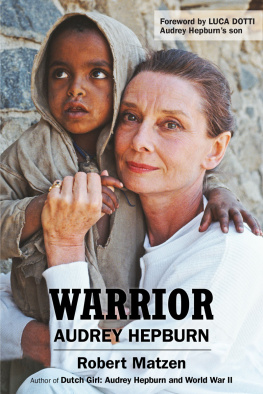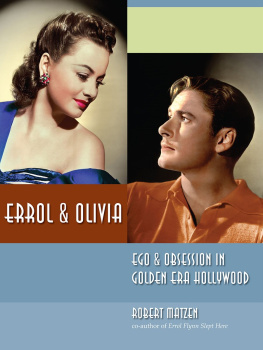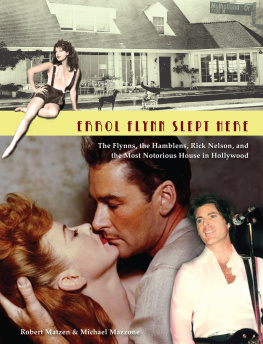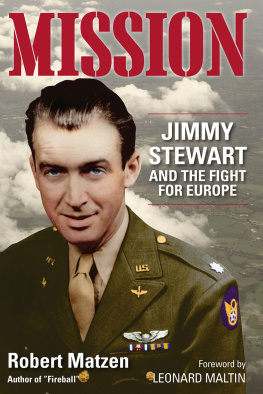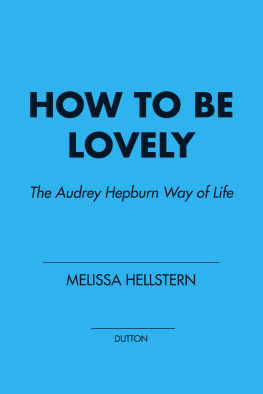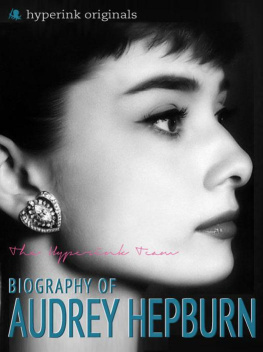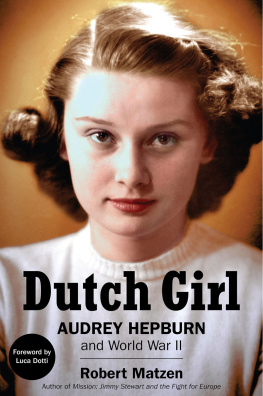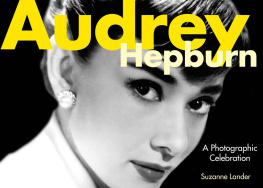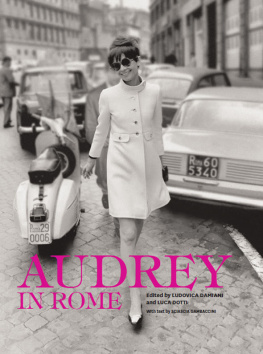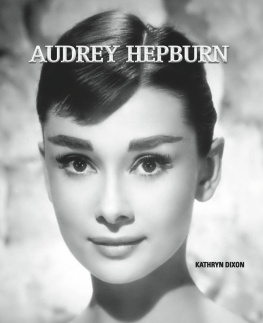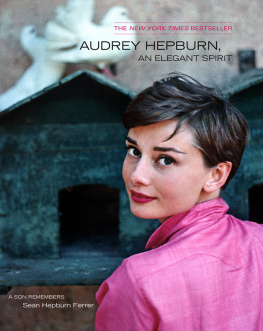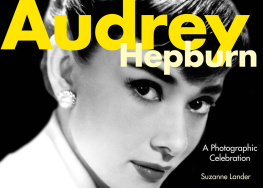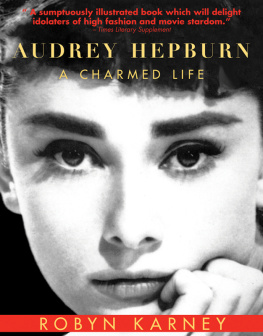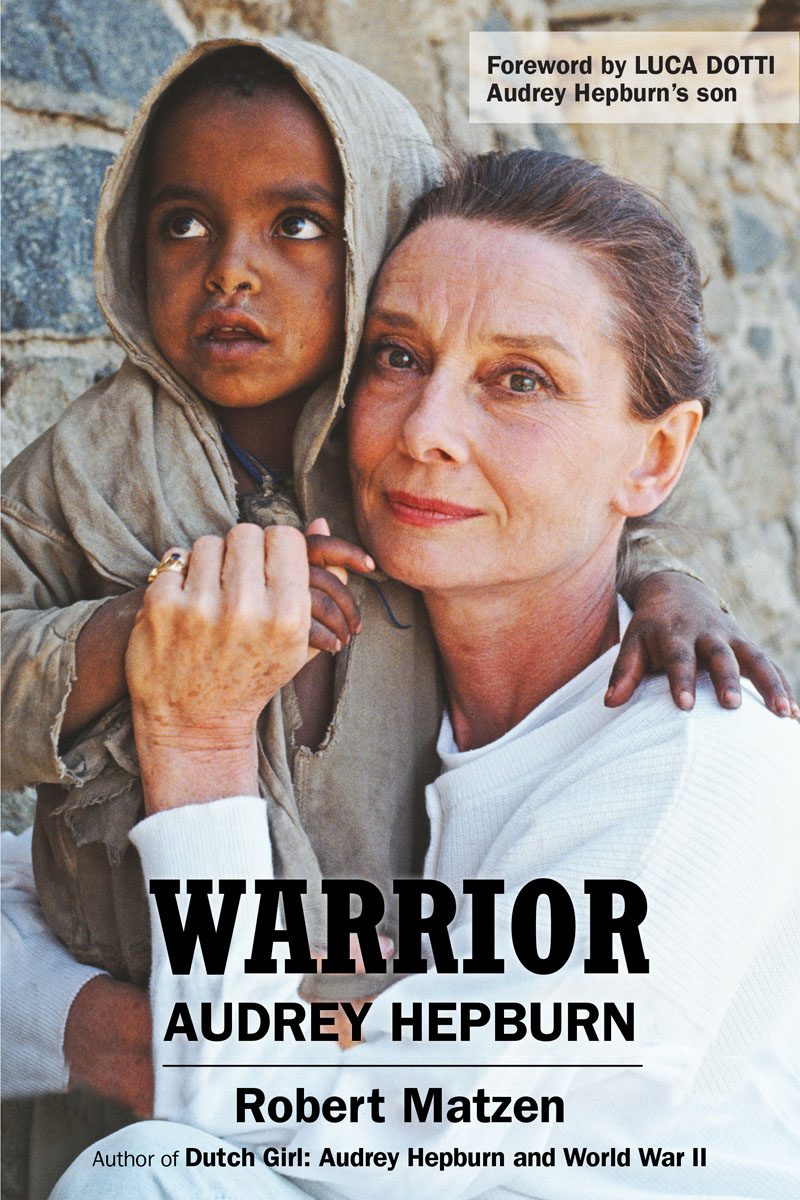

Also by Robert Matzen
Dutch Girl: Audrey Hepburn and World War II
Mission: Jimmy Stewart and the Fight for Europe
Fireball: Carole Lombard and the Mystery of Flight 3
Errol & Olivia
Errol Flynn Slept Here
(with Michael Mazzone)
GoodKnight Books
2021 by Robert Matzen
Foreword 2021 by Luca Dotti
All rights reserved. No part of this book may be reproduced or transmitted in any form or by any means, electronic or mechanical, including photocopying, or by an information storage and retrieval system without permission in writing from the publisher.
Published by GoodKnight Books, an imprint of Paladin Communications, Pittsburgh, Pennsylvania.
Printed in the United States of America.
ISBN 978-1-7352738-3-9
ISBN 978-1-7352738-4-6
Library of Congress Control Number: 2021936208
Book and dust jacket design by Sharon Berk
Front cover photo by Derek Hudson/Hulton Archive via Getty Images
Photo of Robert Matzen by Annie Whitehead/Harvesting Light Photography
To Audrey, for a life that continues to inspire
Contents
Foreword
In Italy the term seminterrato abitabile technically describes a damp and poorly lit basement that is somehow still fit for residential use. This description perfectly matched my first flat in Rome. Nevertheless, on a morning some thirty years ago, its usual moldy scent had to briefly make way in order to pass one final test: my mothers inspection.
My flat passed with flying colors, and my mother and I hopped in a cab to the nearby studios of Rai 1 where she was to sit for an interview, the first of a tightly packed UNICEF Italy schedule, one that would jump-start the project to entrust 7,000 mayors of the worlds largest cities with the protection of childrens rights. By the end of the day I, having only chaperoned Audrey Hepburn from one meeting to another, was frankly exhausted while she was as crisp as her gardens roses in Switzerland.
How do you manage? I asked her.
She said, Luchino, this is my work and its so important. But lets talk about you. You must know that I was really moved to see you in your first ever flat. Its so important; its the beginning of your life, of your independence. It may be small and smelly (damn, she got me!), but its a place and time you will never forget.
Most people define my mother by her physique, her acting skills, her sense of fashion, all neatly tied up by grace and kindness. Quite obviously she was all that, but what kept her going that day in Rome and every single day that she chose to dedicate to the less fortunate ones, was something older and bolder than her looks, or even her age, would suggest.
At the end of his first book on my mother, Dutch Girl, Robert Matzen poignantly describes her as being chased by a bullet, one of the many she was able to dodge in Holland during World War II and one that would finally get her in less than a year from that busy day in Rome.
That image sent shivers up my back and made tears well in my eyes but didnt totally match reality. I still didnt know what exactly was Audrey Hepburns secret. What was the drive that got her out of that rose garden and into the dry hell of East Africa? How did she survive war, her own parents and husbands delusions, and a one-of-a-kind Hollywood career only to realize that all personal and professional accomplishments she achieved just werent enough?
That image of a bullet chasing my mother certainly explains a lot of things. It explains the melancholy and the nightmares, as those are the badges of survivors. But in order to transform horror into beauty and live by it, she needed to turn around, catch that bullet, and put that evil where it could no longer hurt her, within the love in her heart.
My mother chose to become a soldier wrapped up in a uniform of grace and kindness, a soldier that makes time to visit her troops in the seminterrato and praise it like Versailles before jumping on to the next mission.
She chose to not turn her back on the bullet. In facing it, in confronting it, she became a warrior.
Luca Dotti
Rome
December 2020
Preface
This book resulted from my phone conversation with Audrey Hepburns younger son, Luca Dotti, not long after our joint launch of the book Het Nederlandse meisje in the Netherlandsthe Dutch edition of Dutch Girlwhich proved to be a successful and satisfying series of events. We had stood together in the village of Velp on the former site of Villa Beukenhof, home of Audreys family the van Heemstras, to unveil a small statue of Audrey as a teenage ballerina. I think we both had felt the weight of her wartime experiences while there and how the times shaped the remainder of her life, particularly her humanitarian work as a Goodwill Ambassador for UNICEF.
A book about those UNICEF years should have been on my mind then, in Velp, but it took another couple of months for the idea to germinate after the all-important phone call when Luca said to me, UNICEF expected that Audrey Hepburn would be a pretty princess for them at galas. But what they really got was a badass soldier. That statement gave me chills and still does. I thought, if ever there was a theme for a book, this was it.
Once I started down the path, a story began to emerge that I didnt see coming. Hepburn biographers had skimmed over Audreys war years because at age ten when the war began and fifteen at its end, she was simply too young (they thought) to experience anything significant. But I saw the story, tracked it down, and told it. In a similar vein, Hepburn biographers have glossed over the UNICEF years because she was just a Goodwill Ambassador engaging in a series of PR events. To which I say, thank you again, Hepburn biographers, for your oversight.
Imagine for a moment that you reach age fifty-eight having accomplished all your goals in life. You are enjoying retirement surrounded by everything you ever wantedlove, family, nature, and comfort. Then, suddenly, you move all that to second place and put a social cause first. You face bullets and bombs along with criticism and cynicism. Circumstances force you to leave your comfort zone and become political for the first time. You take on dictators and policy makers and deliver speech after speech, staring down stage fright each time.
But no, thats not a story because you were just a Goodwill Ambassador engaging in a series of PR events. Mother Teresa in designer jeans, critics said, crying crocodile tears.
The story told in this book resulted from hours of conversations with the people from around the world who are best qualified to tell it: Audreys closest surviving friends first of all, and of course her son Lucaand UNICEF staff who worked with Audrey all over the world, photographers and journalists who covered her and military men who marveled at her guts in the line of fire. When I told the combat veterans about her experiences in World War IIsurviving strafing by British fighters, artillery fire from both sides, and missions for the Dutch Resistanceah, then her nonchalance at bursts of machine gun fire in Mogadishu made sense.
After spending two years walking in young Audreys footsteps in the Netherlands while researching and writing Dutch Girl, I thought I knew her. I was wrong. Working with Luca revealed new, deeper layers to this womans soul. He patiently helped me understand each of these layers, and then he would lead me on to new discoveries.
Next page
